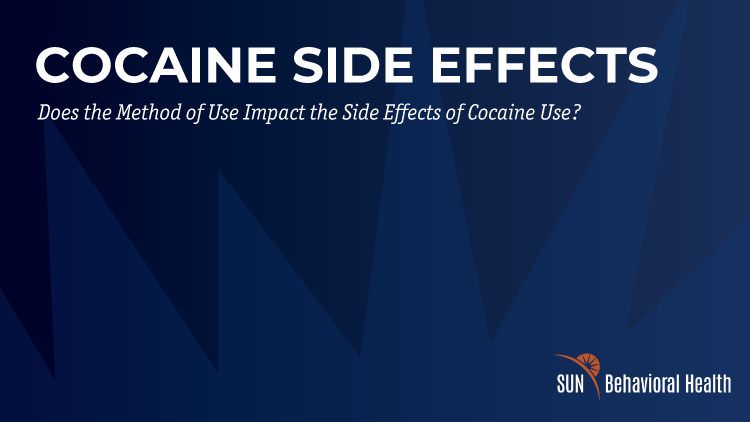Services

You’d never tried cocaine before, but a friend recommended it to you recently when you were complaining about being unable to focus. At first, the effects seem to energize you and give you a sense of alertness. However, after a while, you feel restless and nauseous. You also believed that it may be worsening your symptoms of anxiety. These feelings are all side effects of your cocaine use.
In 2020, 15,000 people in Delaware used cocaine. Every person who used cocaine has experienced some form of a side effect from cocaine. These side effects can range from euphoria to seizures and several side effects in between. Sometimes, these side effects can lead to people deciding it is time to stop using cocaine; however, that decision might not come when it is convenient. At SUN Behavioral Health Delaware, we offer crisis care 24/7 that allows you to get started on your treatment even when other places are closed. We also like to inform people about different experiences that people might have through our blog. Today, we are going to discuss cocaine's side effects.
Whether you smoke, snort, or inject cocaine, you will most likely experience side effects of some sort. These side effects might be short-term or long-term, pleasant or uncomfortable, and even impact your mental and physical health. Sometimes, these side effects may encourage you to continue to use cocaine, while at other times, they might lead you to want to seek recovery from a cocaine use disorder when you’ve felt like you’ve had enough.
The method by which you consume cocaine can have an impact on what side effects you might experience. For example, someone who injects cocaine may have puncture marks known as tracks in the areas where they inject the substance. Injecting cocaine can also increase someone’s risk of developing needle-sharing-based diseases such as hepatitis C and HIV.
For those who usually smoke cocaine, they may experience damage to their lungs. Those with asthma have reported having worsening asthma symptoms due to smoking cocaine.
Snorting cocaine can result in several serious effects. For example, some people lose their sense of smell after regularly snorting cocaine. In contrast, others experience regular nosebleeds because the nasal cavity is weaker. Runny noses are also a common side effect that people who snort cocaine may experience. People who snort cocaine may also experience trouble swallowing, hoarseness, and their nasal septum being irritated and inflamed.

When someone takes cocaine, the effects they get from the high come quickly and leave just as fast. It can even depend on the method of use for how quickly cocaine effects can come and go. For example, if you were to snort cocaine, it may take an hour before you feel the impact, but once you do feel the effects, they last for 15-30 minutes. Whereas smoking cocaine involves effects appearing within a few minutes, but they only last 5-10 minutes.
However, these effects are often only short-term effects. Long-term cocaine use can also result in side effects that impact different areas of your health. These side effects may include things such as a cocaine use disorder, tolerance, or organ damage.
There are several different types of short-term effects someone might experience when they take cocaine. These effects can range from good to bad, depending on the person. People might experience seemingly positive side effects like energy, euphoria, and mental alertness, which may make them feel like they can perform tasks more quickly. They may also experience a sensitivity to sight, sound, and touch, while others experience a decreased need for sleep or food. These side effects are typically short-lived and fade away, resulting in people needing more cocaine to maintain those effects.
However, there are also adverse side effects that someone might experience when they take cocaine even once. These might include:
Still, there are even more severe side effects that someone might experience from taking cocaine one time. For example, some people might experience heart attacks, headaches, seizures, or a coma. Other people might have abdominal pain or nausea. An overdose and potential death due to cardiac arrest or seizures is also possible.
If you have been consuming cocaine for a long time, you may experience more long-term side effects. Repeated use, for example, may lead to people developing a cocaine use disorder or building a tolerance, which results in the need to consume more cocaine to experience the same effects. You may also be more likely to engage in cocaine binges, which can result in side effects such as panic attacks, irritability, and auditory hallucinations.
Cocaine is also likely to result in damage to your vital organs. For example, your gastrointestinal tract may experience tears and ulcers. Cocaine use can also lead to people losing their appetite. This loss of appetite may result in weight loss or malnourishment. Your cardiovascular system may have increased risks with repeated cocaine use. Heart attacks, strokes, and seizures can occur more frequently for those who use cocaine over some time. Your brain can also be impacted by cocaine use as bleeding in the brain can occur, as well as impairing cognitive functions such as memory and the ability to perform motor tasks.
The consumption of cocaine can have severe impacts on both your mind and body. These side effects are most likely to occur with repeated use, although some of them can occur after only using cocaine a few times.
The more frequently someone consumes cocaine, the more likely they are to develop a cocaine use disorder. A cocaine use disorder is typically defined as having a tolerance to the effects of cocaine and experiencing cocaine withdrawal symptoms once you are no longer taking the substance. Some people may also find themselves spending more time thinking about cocaine than loved ones or work. Others may continue to take it despite the development of paranoia, weight loss, or seizures.
There are several physiological side effects that someone might experience when they have been using cocaine regularly. Some people might experience paranoia, while others experience hallucinations and delusions. They may be more prone to developing depression, which can lead to thoughts of suicide. Sometimes, people who use cocaine regularly may experience more edginess, irritability, or impatience. These feelings may result in someone becoming more aggressive. However, not everyone who uses cocaine will experience all of these side effects.
Some physical side effects can occur when someone uses cocaine. These might include abdominal pain, nausea, and headaches but can also include narrowed blood vessels, increased body temperature, and increased heart rate. People may also be more likely to experience heart attacks, strokes, and seizures. It is also possible to experience an overdose from using too much cocaine.
Signs of a cocaine overdose may include:
If someone happens to experience a cocaine overdose, it is vital to remain calm and call 911 as soon as possible. Please stay on the line with the 911 operator to update them on any changes. Also, be willing to answer any first responders' questions when they arrive.

Handling a cocaine use disorder can often feel like you are alone in a world where nobody understands you. Cocaine has had control over your life for so long that you don’t know what it looks like without it. Perhaps a part of you feels some sense of comfort in your cocaine use despite knowing you will have a healthier life without it. You don’t have to be alone, and you are strong enough to move forward away from cocaine. By seeking cocaine addiction treatment, you will be able to interact with people who are willing and open to helping you achieve your goals. Treatment can give you a support system of people who are with you every step of your recovery journey.
SUN Behavioral Health Delaware solves unmet needs in Georgetown, DE. We offer no-cost care assessments that allow you to meet with a representative to determine your best care plan before you start treatment with us. For more information or questions, or if you are ready to initiate your recovery journey today, please contact us at 302-604-5600.